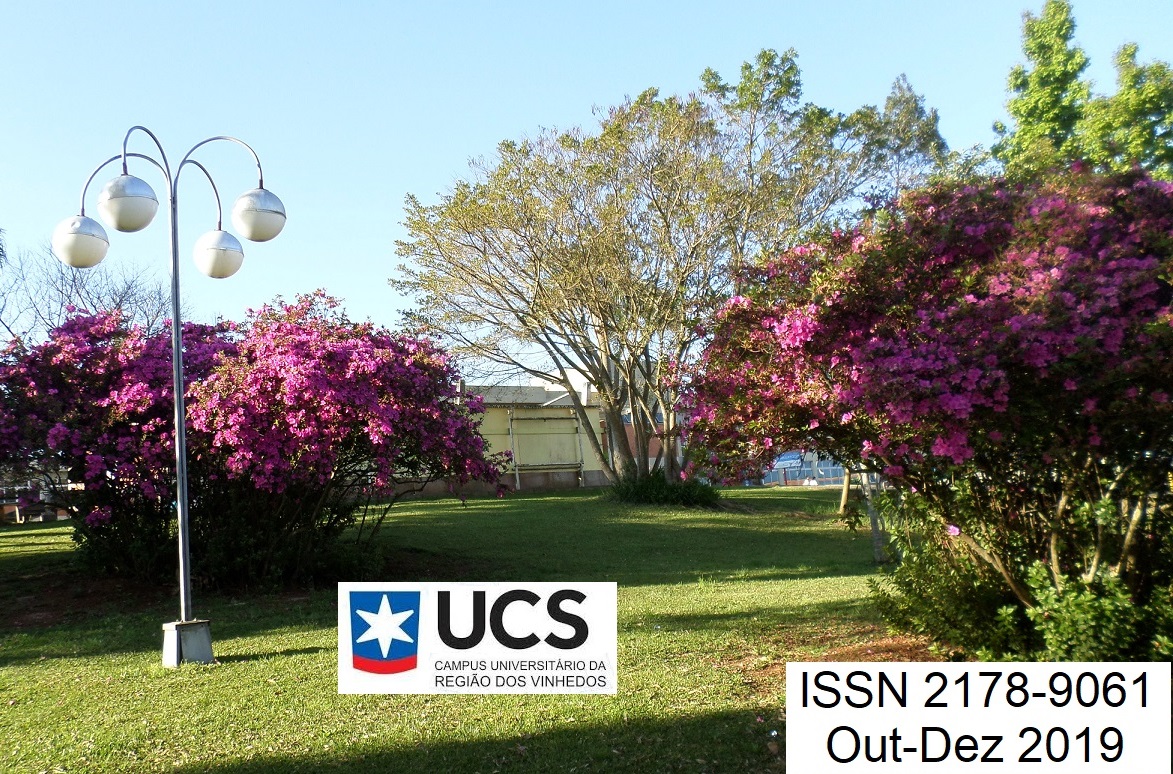O Futuro da Hospitalidade: Impactos dos Modelos Disruptivos de Hospedagem no Mercado Tradicional / The Future of Hospitality: Impacts of Disruptive Hospitality Models in the Traditional Market
Palabras clave:
Tourism. Tourism. Hospitality. Hospitality. Disruptive Innovation. Disruptive Innovation. Sharing Economy. Airbnb.Resumen
RESUMO
Com novos contornos surgindo no setor de meios de hospedagem a partir do fenômeno da hospedagem compartilhada, questionamentos acerca de seus desdobramentos passam a ocupar diálogos e discussões no meio acadêmico e mercadológico. Torna-se necessária, portanto, uma discussão aprofundada e fundamentada em fatos para que saibamos a real dimensão dos impactos dos modelos disruptivos de hospedagem no setor tradicional, bem como a melhor forma de encará-los. Investido da tarefa de oferecer esta discussão, este trabalho tem como objetivo descrever o atual contexto do mercado de meios de hospedagem com a inserção de um novo modelo disruptivo baseado na hospedagem compartilhada, o Airbnb. Como método, realizamos uma revisão sistemática da literatura pertinente dos últimos cinco anos, mapeando as principais temáticas discutidas neste contexto, e apontando os resultados destes estudos. Nossos resultados se manifestam em oito principais temas discutidos nos 31 artigos restantes de nossa filtragem. Em nossas considerações finais, elaboramos a aplicabilidade de nossa pesquisa no mercado tradicional de meios de hospedagem, assinalamos as limitações deste trabalho e sugerimos futuros caminhos para dar continuidade este tipo de pesquisa.
PALAVRAS-CHAVE
Turismo. Meios de Hospedagem. Inovação Disruptiva. Economia Compartilhada. Airbnb.
ABSTRACT
With new arrangements emerging from the hospitality sector after the sharing hospitality phenomenon, questioning regarding its repercussion has also started to show in discourses and debates in the academic and market environment. It becomes imperative, therefore, an in depth and well-grounded discussion so we may perceive the real dimension of the impacts of disruptive hospitality models in the traditional market, and also the best way to manage them. Invested with the task of proposing this discussion, this paper aims to describe the current context of hospitality market with the insertion of a new disruptive model based on the sharing hospitality, Airbnb. The methodology of our research consists of a systematic literature review regarding the last five years, mapping the main themes discussed in this context, and pointing out the results of these studies. Our results are expressed into eight main themes discussed throughout the 31 final papers resulted from our filtration process. Our final considerations consist of the suitability of our study for the hospitality traditional market decision makers, the limitations and restrictions of our research, and suggestions for future paths to be unraveled in order to continue this discussion. (Tradução: Rachel de Paula Canedo Branco)
KEYWORDS
Tourism. Hospitality. Disruptive Innovation. Sharing Economy. Airbnb.
AUTORIA
Rachel de Paula Canedo Branco - Mestranda em Turismo, Universidade Federal Fluminense, Niterói, Rio de Janeiro, Brasil. Currículo: http://lattes.cnpq.br/6031466824818832 E-mail: rachel_branco@id.uff.br
REFERÊNCIAS
Airbnb. (2013). New Study: Airbnb community contributes AUD $214 million to Sydney and its suburbs, brings tourists to new neighbourhoods. Airbnb Australia Press. Link
Airbnb. (2018). About us: Airbnb Press. Link
Antunes, C. (2016). Muitos turistas não iriam a Lisboa sem a Airbnb. Jornal Expresso. Link
Akbar, Y. H., & Tracogna, A. (2018). The sharing economy and the future of the hotel industry - Transaction cost theory and platform economics. International Journal of Hospitality Management, 71, 91-101. Link
Aznar, J. P., Sayeras, J. M., Galiana, J. & Rocafort, A. (2016). Sustainability commitment, new competitors’ presence, and hotel performance: the hotel industry in Barcelona. Sustainability, 8(8), 755-768. Link
Aznar, J. P., Sayeras, J. M., Rocafort, A. & Galiana, J. (2017). The irruption of Airbnb and its effects on hotel profitability: An analysis of Barcelona's hotel sector. Intangible Capital, 13(1), 147-159. Link
Aznar, J. P., Sayeras, J. M., Segarra, G. & Claveria, J. (2018a) Airbnb landlords and price strategy: Have they learnt price discrimination from the hotel industry? Evidence from Barcelona. International Journal of Tourism Sciences, 18(1), 16-28. Link
Aznar, J. P., Sayeras, J. M., Segarra, G. & Claveria, J. (2018b). Airbnb competition and hotels' response: the importance of online reputation. Athens Journal of Tourism, 5(1), 7-19. Link
Bashir, M. & Verma, R. (2016). Airbnb disruptive business model innovation: Assessing the impact on hotel industry. International Journal of Applied Business and Economic Research, 14(4), 2595-2604. Link
Belk, R. (2014). Sharing versus pseudo-sharing in Web 2.0. The Anthropologist, 18(1), 7-23. Link
Birinci, H., Berezina, K. & Cobanoglu, C. (2018). Comparing customer perceptions of hotel and peer-to-peer accommodation advantages and disadvantages. International Journal of Contemporary Hospitality Management, 30(2), 1190-1210. Link
Blal, I., Singal, M. & Templin, J. (2018). Airbnb's effect on hotel sales growth. International Journal of Hospitality Management, 73, 85-92. Link
Bock, K. (2015). The changing nature of city tourism and its possible implications for the future of cities. European Journal of Futures Research, 3(20), s.p. Link
Bohórquez, L. (2018, abril 25). Palma é a primeira cidade espanhola a proibir aluguel turístico, como Airbnb. El País. Link
Boros, L., Dudás, G., Kovalcsik, T., Papp, S. & Vida, G. (2018). Airbnb in Budapest: Analysing spatial patterns and room rates of hotels and peer-to-peer accommodations. Geojournal of Tourism and Geosites, 21(1), 26-38. Link
Botsman, R. & Rogers, R. (2011). O que é meu é seu: como o consumo colaborativo vai mudar o nosso mundo. Porto Alegre: Bookman.
Choi, K.-H., Jung, J., Ryu, S., Kim, S.-D. & Yoon, S.-M. (2015). The relationship between Airbnb and the hotel revenue: In the case of Korea. Indian Journal of Science and Technology, 8(26), 1-8. Link
Christensen, C. M., Raynor, M. E. & McDonald, R. (2015) What is disruptive innovation? Harvard Business Publishing.
Couchsurfing. (2018). About us. Link
Dogru, T., Mody, M. A. & Suess, C. (2017). The hotel industry's Achilles Heel? Quantifying the negative impacts of Airbnb on Boston's hotel performance. Boston Hospitality Review, 5(3), 1-11. Link
Forgacs, G. & Dimanche, F. (2016). Revenue challenges for hotels in the sharing economy: facing the Airbnb menace. Journal of Revenue and Pricing Management, 15(6), 509-515. Link
Gebbia, J. (2016, fevereiro). How Airbnb designs for trust. [Arquivo de vídeo]. Link
Ginindza, S. & Tichaawa, T. M. (2017) The impact of sharing accommodation on the hotel occupancy rate in the kingdom of Swaziland. Current Issues in Tourism, 22(16), 1975-1991. Link
Gotman, A. (2009). O comércio da hospitalidade é possível? Revista Hospitalidade, 6(2), 3-27. Link
Gunter, U. & Onder, I. (2018). Determinants of Airbnb demand in Vienna and their implications for the traditional accommodation industry. Tourism Economics, 24(3), 270-293. Link
Gutiérrez, J., García-Palomares, J. C., Romanillos, G. & Salas-Olmedo, M. H. (2017). The eruption of Airbnb in tourist cities: Comparing spatial patterns of hotels and peer-to-peer accommodation in Barcelona. Tourism Management, 62, 278-291. Link
Guttentag, D. A. (2015). Airbnb: disruptive innovation and the rise of an informal tourism accommodation sector. Current Issues in Tourism, 18(12), 1192-1217. Link
Guttentag, D. A. (2016). Why tourists choose Airbnb: A motivation-based segmentation study underpinned by innovation concepts. Tese. Doutorado em Recreation and Leisure Studies University of Waterloo, Waterloo, Ontário, Canadá. Link
Guttentag, D. A. & Smith, S. L. J. (2017). Assessing Airbnb as a disruptive innovation relative to hotels: Substitution and comparative performance expectations. International Journal of Hospitality Management, 64, 1-10. Link
Guttentag, D. A., Smith, S., Potwarka, L. & Havitz, M. (2017). Why tourists choose airbnb: a motivation-based segmentation study. Journal of Travel Research, 57(3), 342-359. Link
Gyódi, K. (2017). Airbnb and the hotel industry in Warsaw: an example of the sharing economy? Central European Economic Journal, 2(49), 23-34. Link
Hajibaba, H. & Dolnicar, S. (2017) Substitutable by peer-to-peer accommodation networks? Annals of Tourism Research, 66, 185-188. Link
Kljucnikov, A., Krajcík, V. & Vincúrová, Z. (2018). International sharing economy - the case of Airbnb in the Czech Republic. Economics & Sociology, 11(2), 126-137. Link
Koh, E. & King, B. (2017). Accommodating the sharing revolution: a qualitative evaluation of the impact of Airbnb on Singapore’s budget hotels. Tourism Recreation Research, 42(4), 409-421. Link
Manoharan, A. & Singal, M. (2017). A systematic literature review of research on diversity and diversity management in the hospitality literature. International Journal of Hospitality Management, 66, 77-91. Link
McGowan, R. & Mahon, J. (2018). David versus Goliath: Airbnb and the New York hotel industry. Archives of Business Research, 6(4), 130-142. Link
Mody, M. A., Suess, C. & Dogru, T. (2017a). Comparing apples and oranges? Examining the impacts of Airbnb on hotel performance in Boston. Boston Hospitality Review, 5(2), 1-15. Link
Mody, M. A., Suess, C. & Lehto, X. (2017b) The accommodation experiencescape: a comparative assessment of hotels and Airbnb. International Journal of Contemporary Hospitality Management, 29(9), 2377-2404. Link
Mody, M. A., Suess, C. & Lehto, X. (no prelo). Going back to its roots: Can hospitableness provide hotels competitive advantage over the sharing economy? International Journal of Hospitality Management, 76, 286-298. Link
Pereira, F. F. & Coutinho, H. R. M. (2007). Hotelaria: da era antiga aos dias atuais. Revista Eletrônica Aboré, 3. Link
Poon, K. Y. & Huang, W.-J. (2017) Past experience, traveler personality and tripographics on intention to use Airbnb. International Journal of Contemporary Hospitality Management, 29(9), 2425-2443. Link
Prayag, G. & Ozanne, L. K. (2018). A systematic review of peer-to-peer (P2P) accommodation sharing research from 2010 to 2016: progress and prospects from the multi-level perspective. Journal of Hospitality Marketing & Management, 27(6), 649-678. Link
Proença Júnior, D. & Silva, E. R. (2016). Contexto e processo do mapeamento sistemático da literatura no trajeto da pós-graduação no Brasil. Transinformação, 28(2), 233-240. Link
Quadros, A. H. (2011). A hospitalidade e o diferencial competitivo das empresas prestadoras de serviço. Revista Hospitalidade, 8(1), 43-57. Link
Rejowski, M. & Solha, K. T. (2002). Turismo em um cenário de mudanças. In M. Rejowski (Org.), Turismo no percurso do tempo, 71-115. São Paulo: Aleph.
Smith Travel Research (2017). Airbnb & hotel performance: An analysis of proprietary data in 13 global markets. Link
Souza, L., Kastenholz, E. & Barbosa, M. L. A. (2016). Inovação disruptiva no turismo: O caso das hospedagens domiciliares pessoa a pessoa (p2p) promovidas pela Web 2.0. Anais Brasileiros de Estudos Turísticos, 6(2), 58-68. Link
Varma, A., Jukic, N., Pestek, A., Shultz, C. J. & Nestorov, S. (2016). Airbnb: Exciting innovation or passing fad? Tourism Management Perspectives, 20, 228-237. Link
Volgger, M., Pforr, C., Stawinoga, A. E., Taplin, R. & Matthews, S. (2018). Who adopts the Airbnb innovation? An analysis of international visitors to Western Australia. Tourism Recreation Research, 43(3), 305-320. Link
Xie, K. L. & Kwok, L. (2017). The effects of Airbnb’s price positioning on hotel performance. International Journal of Hospitality Management, 67, 174-184. Link
Zervas, G., Proserpio, D. & Byers, J. W. (2017). The rise of the sharing economy: estimating the impact of Airbnb on the hotel industry. Journal of Marketing Research, 54(5), 687-705. Link
PROCESSO EDITORIAL
Recebido: 16 OUT 18. Avaliado: OUT-NOV. Aceito: 22 ABR 19.
Descargas
Publicado
Cómo citar
Número
Sección
Licencia
Autores que publicam nesta revista concordam com os seguintes termos:
Os Autores mantém os direitos autorais e concedem à revista o direito de primeira publicação, com o trabalho simultaneamente licenciado sob a Creative Commons Attribution License que permitindo o compartilhamento do trabalho com reconhecimento da autoria do trabalho e publicação inicial nesta revista.
Autores têm autorização para assumir contratos adicionais separadamente, para distribuição não-exclusiva da versão do trabalho publicada nesta revista (ex.: publicar em repositório institucional ou como capítulo de livro), com reconhecimento de autoria e publicação inicial nesta revista.
Autores têm permissão e são estimulados a publicar e distribuir seu trabalho online (ex.: em repositórios institucionais ou na sua página pessoal) a qualquer ponto antes ou durante o processo editorial, já que isso pode gerar alterações produtivas, bem como aumentar o impacto e a citação do trabalho publicado (Veja O Efeito do Acesso Livre).








